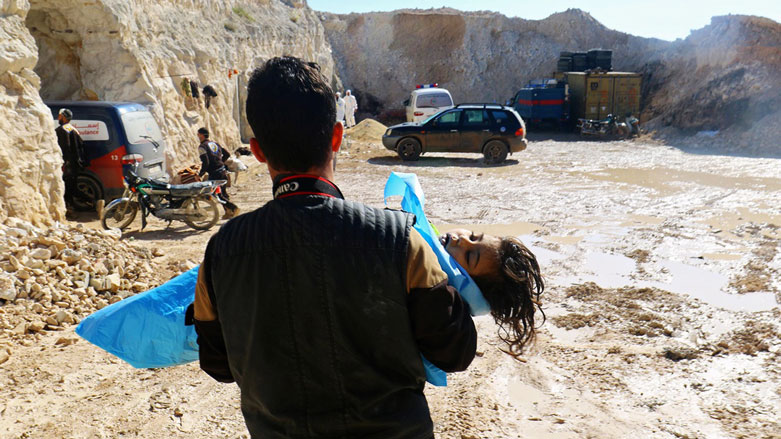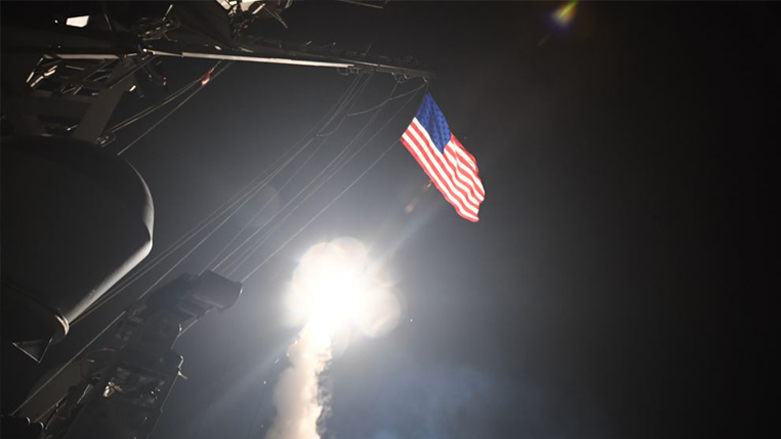US warns Syria, Russia on use of chemical weapons

WASHINGTON DC (Kurdistan 24) - On Tuesday, both the Pentagon and State Department reiterated warnings to Damascus, and its Russian backer, against using chemical weapons in the regime’s widely anticipated offensive in Idlib, the last rebel-held province in Syria.
If there were “any Russian and/or Syrian regime offensive on Idlib and any kind of escalation in that area, we would hold them accountable,” Nauert said, responding to a question from Kurdistan 24, “especially, most especially, for the use of chemical weapons.”
That message was conveyed by Secretary of State Mike Pompeo to Russia’s Foreign Minister in a phone conversation last week, she explained.
The US “has taken a very strong stance in the past when chemical weapons have been used,” she added.
Secretary of Defense Jim Mattis, speaking at a Pentagon press conference, characterized Russia’s decision as to whether it is prepared to prevent Syria from using such weapons as “the heart of the issue.”
When Russian President Vladimir Putin visited Berlin ten days ago, German Chancellor Angela Merkel raised the Syrian offensive on Idlib, asking him to use his influence to restrain Damascus.
She also spoke by phone with President Donald Trump on Monday, urging him to press Putin on the need to limit Damascus’ actions in Idlib.
The UN has warned that a Syrian offensive on Idlib could produce “a humanitarian emergency at a scale not yet seen” in the country’s civil war.
A new flood of refugees would cause serious problems for Germany and other European countries, as well as Turkey.
Mattis noted that the administration had twice “acted” in response to Syria’s use of chemical weapons, strongly implying that it was prepared to do so a third time.
Earlier this year, on April 14, the US, France, and Britain, launched a military strike on Syria in response to its apparent use of sarin gas in Eastern Ghouta, a rebel-held suburb of Damascus.
In 2017, the US struck a Syrian air base, following the regime’s use of sarin gas in Khan Sheikhoun.
Mattis explained that the State Department has been in “recent active communication with Russia to enlist them in preventing” Damascus from using chemical weapons again.
Nauert related several conversations that senior US officials have had with their Russian counterparts.
In addition to Pompeo’s discussion with Lavrov, US warnings were also conveyed by Amb. John Bolton, White House National Security Adviser, in his meeting last week in Geneva with Nikolai Patrushev, and by Gen. Joseph Dunford, Chairman of the Joint Chiefs of Staff, in a discussion with Gen. Valery Gerasimov, Chief of the General Staff of the Armed Forces of Russia.
There is little evidence, at least in the public record, however, that the US warnings are having significant effect. Rather, Russia is building up its naval forces around Syria.
The Russian Navy has sent its biggest task force to the area since Moscow’s intervention in Syria’s civil war began three years ago, Russian media has reported.
Russian media also claims that the US is preparing a “false flag” operation, in which rebels will use chemical weapons to serve as a pretext for another US attack on Syria and that the US is bolstering its naval forces in the Eastern Mediterranean for that purpose.
However, Pentagon Spokesman Eric Pahon dismissed the Russian claim as “nothing more than propaganda.


